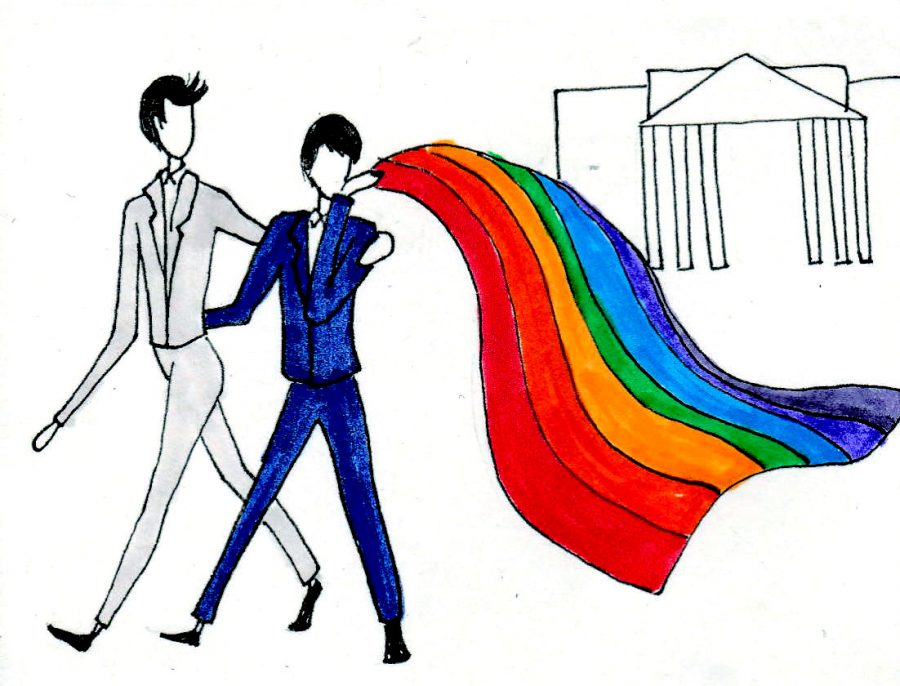Last year, in the landmark Supreme Court case Obergefell v. Hodges, love won. The federal legalization of gay marriage was foreshadowed by rising liberal views on marriage.
However, even with national protection, the push for national inclusion is hardly stalled. In a recent dispute with a colleague, we argued about this implementation versus the traditional conjugal view of marriage. It recently occurred to me that not only does there seem to be few viable arguments against gay marriage, there are actually none.
Let’s discuss some of the most persistent positions against same-sex marriage in the first part of this series, and hopefully I can demonstrate that not a single one has any reasonable merit whatsoever.
1. Marriage is a taken term. It cannot be appropriated for homosexual couples.
Voters that maintain marriage has always stood for a man and a woman, that it is a “taken” term, are not historically inclined. In fact, the meanings of man and woman, in the states at least, have changed only recently. When these people say that homosexual couples can form a civil contract, but they just need their own contract, they’ve chosen homosexual couples arbitrarily.
Shouldn’t they also want interracial couples to have their own separate contract distinct from marriage? “Marriage” hasn’t just stood for a man and a woman: Until 1967, it stood for men and women of the same ethnicity or pigmentation.
Marriage was not legally possible for, say, a white woman and an ostensibly-white man with even “one drop” of African descent. Anti-miscegenation laws persisted well after the end of Transatlantic slavery and thoroughly defined marriage before the current conception of “a man and a woman.”
Mixed-race marriage was inconceivable. Now, defining marriage to descendants would be violating substantive due process and furthermore, ridiculous; defining marriage to just separate-sex couples would be the same.
And again, “marriage” has never just meant one man and one woman. Whose arbitrary history need be consulted to actually find evidence of this linear definition? Polygamous marriage was legal until Abraham Lincoln signed prohibitory laws in the middle 1800s. Marriage has always been a flexible term — its shared quality being that it concerns human beings.
2. Marriage is for procreation.
This has a closer chance to being historically accurate than “marriage is between a man and a woman.” Yet upon study, it fails entirely. That marriage, since its creation, has always promised children and been all about children, is a claim far removed from history.
In early human history, marriage was more about power alliances between tribes and factions than bearing a child. The concept of “procreation” as the cornerstone of marriage is a piece of worthless rhetoric.
And in instances where future procreation was the goal, marriage was initiated to ensure the child would biologically be the father’s, confining the woman sexually and essentially debasing the human’s role as proprietary.
This is hardly the arrangement that proponents of the above claim think exists. Women have had an awful place in marriage politics, which is why feminism partially aided the same-sex marriage movement.
And in practical terms, there are plenty of married heterosexual couples choosing not to procreate (as there has been for centuries), and there are plenty of married homosexual couples choosing artificial insemination or surrogacy.
Our society doesn’t prevent infertile heterosexual couples from saying their vows. Also, in the near future it will likely be possible for two women to combine their genetic material and produce a child.
The propagation of the species is not contingent on ceremonial vows; it happens with or without binding documents. Marriage in and of itself is a legal contract and nothing else. There is nothing about civil obligation that stands to instantaneously enable childbearing.
In Part II, I’ll cover the claims that marriage is a sacred bond, that homosexual couples cannot raise children as well as straight couples and concerns about government involvement in marriages. Stay tuned to demolish irrational and uninformed prejudices.
William Rein can be reached at orionopinioneditor@gmail or @toeshd on Twitter.









